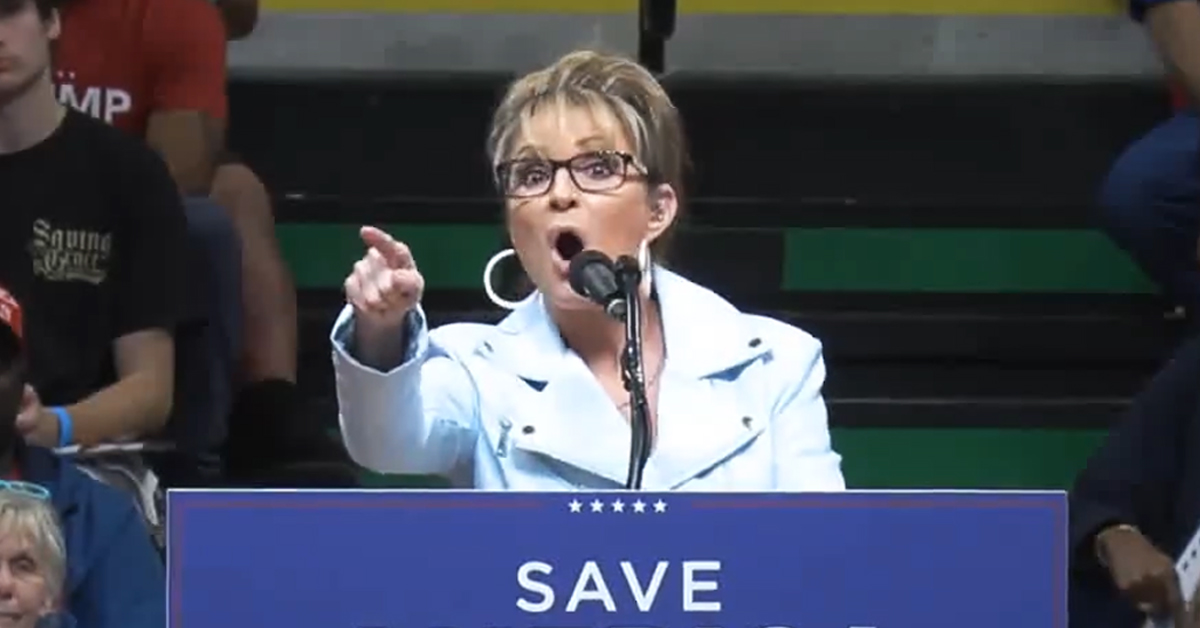‘Palin Was Most Offensive To The Most Voters’: Defenders of Rank Choice Voting Speak Out After GOP Calls Alaska Election Loss a ‘Scam’

Many on the right and in the GOP denounced ranked choice voting on Wednesday night and well into Thursday after the voting system led to Alaska electing a Democrat to its open statewide House seat – a surprise defeat for former Gov. Sarah Palin.
Sen. Tom Cotton (R-AR) led a chorus of angry condemnation of ranked choice voting, which Alaskan voters approved in 2020 as many races in the state are only contested by Republicans.
Cotton tweeted, “Ranked-choice voting is a scam to rig elections. 60 percent of Alaska voters voted for a Republican, but thanks to a convoluted process and ballot exhaustion — which disenfranchises voters — a Democrat ‘won.'”
Recently polling out of Alaska found that 85 percent of voters found the process “simple” and two weeks after the vote 62 percent of Alaskans polled still support the system.
Ranked choice voting begins with an open primary in which the top 4 candidates advance to the general election.
“Then, in the general election, instead of just voting for one of the top four candidates, voters rank their preferences in order. They are allowed to rank candidates one through four, but are not required to do so — voters could instead choose only to rank their preferred candidate, or only rank their top two.
If no candidate receives more than 50% of the first-place votes, then the ranked-choice system is used to determine the winner,” explained CNN on the process.
While Cotton dubbed the system a “scam,” many of its supporters point to the system as consensus building and more democratic as the winning candidate must pass the 50 percent threshold.
Former GOP Congressman Justin Amash defended the system on Twitter, arguing, “The problem for the Republican Party in Alaska wasn’t ranked-choice voting; it was their candidates. Requiring a candidate to get more than 50% to be elected isn’t a scam; it’s sensible. Let’s get ranked-choice voting everywhere.”
The problem for the Republican Party in Alaska wasn’t ranked-choice voting; it was their candidates. Requiring a candidate to get more than 50% to be elected isn’t a scam; it’s sensible. Let’s get ranked-choice voting everywhere.
— Justin Amash (@justinamash) September 1, 2022
Democracy advocate Mindy Finn noted, “Ranked choice, or instant runoff, doesn’t favor one party; it gives voters confidence that choosing the candidate they like the most won’t elect the candidate they like the least a.k.a. the spoiler effect. In this case, it appears Palin was most offensive to the most voters.”
Ranked choice, or instant runoff, doesn’t favor one party; it gives voters confidence that choosing the candidate they like the most won’t elect the candidate they like the least a.k.a. the spoiler effect. In this case, it appears Palin was most offensive to the most voters.
— Mindy Finn (@mindyfinn) September 1, 2022
Scott Santens added, “Ranked-choice voting helps elect candidates that a wider percentage of voters actually prefer. This makes it harder for polarizing candidates to win, and also harder for negative campaigning to win. Most voters simply don’t like extremist candidates and prefer the not-Palins.”
Ranked-choice voting helps elect candidates that a wider percentage of voters actually prefer. This makes it harder for polarizing candidates to win, and also harder for negative campaigning to win.
Most voters simply don’t like extremist candidates and prefer the not-Palins. https://t.co/nTKfv7PBME
— Scott Santens (@scottsantens) September 1, 2022
Other observers took on Cotton directly. Journalist Kara Swisher wrote, “He cannot be this stupid by accident. It’s on purpose. The second choice of Republicans who voted for Begich was not Trump endorsed Palin, but the Democratic candidate or, um, no one. Let that sink in.”
He cannot be this stupid by accident. It’s on purpose. The second choice of Republicans who voted for Begich was not Trump endorsed Palin, but the Democratic candidate or, um, no one. Let that sink in. https://t.co/SgMTSIck5Z
— Kara Swisher (@karaswisher) September 1, 2022
Author Keith Boykin tried to turn the tables on Cotton and blasted the Electoral College, “Actually, Tom Cotton, the Electoral College is the scam that rigs elections. Democrats have won the popular vote in 7 of the last 8 presidential elections, but because of the electoral college, Republicans got to be president twice in 20 years against the will of the people.”
Actually, Tom Cotton, the Electoral College is the scam that rigs elections. Democrats have won the popular vote in 7 of the last 8 presidential elections, but because of the electoral college, Republicans got to be president twice in 20 years against the will of the people. https://t.co/ZVwq7Y4hdc
— Keith Boykin (@keithboykin) September 1, 2022
Former Clinton advisers Zac Petkanas offered a similar sentiment, “Really love seeing all the staunch defenders of the Electoral College trash Rank Choice Voting as complicated and undemocratic.”
Really love seeing all the staunch defenders of the Electoral College trash Rank Choice Voting as complicated and undemocratic.
— Zac Petkanas (@Zac_Petkanas) September 1, 2022
Pundit S.E. Cupp added, “Alaska voted for it in 2020. States rights are only cool if they work in your favor though, right? Otherwise: “SCAM!””
Alaska voted for it in 2020. States rights are only cool if they work in your favor though, right? Otherwise: “SCAM!” pic.twitter.com/BZEHiLqnJX
— S.E. Cupp (@secupp) September 1, 2022
Below are some more defenses of ranked choice voting:
Ranked choice voting – used all over the world – gives the public a more nuanced way to represent their views.
Rather than engage with those arguments, Cotton characterizes any legal and democratic process that does not result in his side winning to be “a scam to rig elections.” https://t.co/gaQyclm34m
— Don Moynihan (@donmoyn) September 1, 2022
Wrong. Again, Tom. Would love to see your tweet if Palin had won. And exactly how does #RCV “rig elections”, again? Typical BS claptrap and no facts. Defeat. It’s a real thing, Tom. https://t.co/IqEPQFATfc
— Michael Steele (@MichaelSteele) September 1, 2022
The new(ish) playbook: blame any election loss on the election being “rigged.”
There’s apparently no such thing as a valid loss if your side didn’t win.
This mentality is a disease on our democracy. https://t.co/iNb2elPhWF
— Josh Douglas (@JoshuaADouglas) September 1, 2022
Someone tell Ireland, quick! https://t.co/NfSIjBeK0S
— Gavin Sheridan (@gavinsblog) September 1, 2022
RCV makes democracy more fair and functional, so of course Tom Cotton hates it. Republicans rely on gerrymandering and voter suppression to win. When that doesn’t work they just try to overthrow the government. Their election rigging accusations are projections. https://t.co/qTxYaGFyFs
— Adam Best (@adamcbest) September 1, 2022
New: The Mediaite One-Sheet "Newsletter of Newsletters"
Your daily summary and analysis of what the many, many media newsletters are saying and reporting. Subscribe now!






Comments
↓ Scroll down for comments ↓